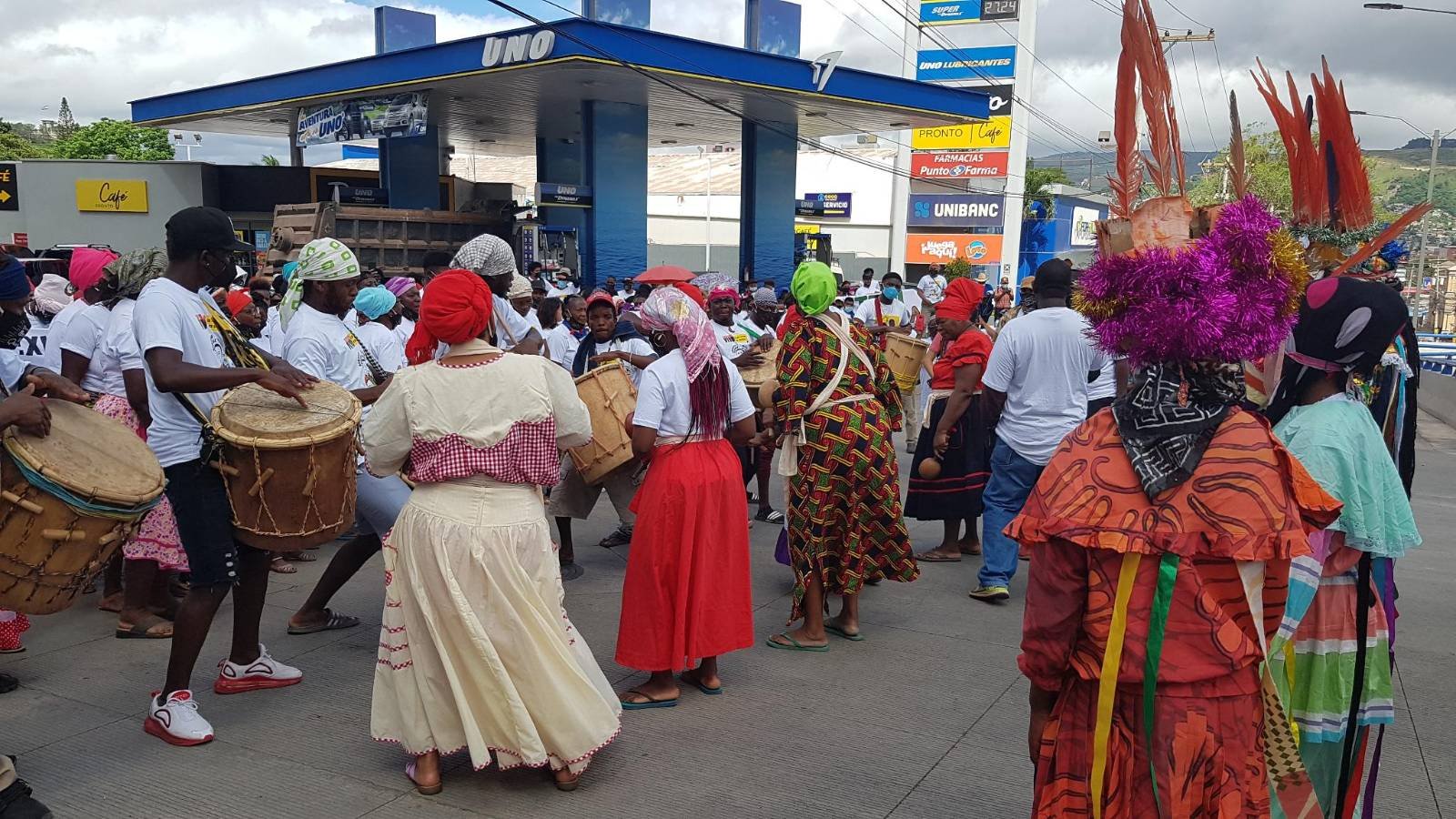Celebrating OFRANEH on the International Day for People of African Descent
To mark the International Day for People of African Descent, PBI UK volunteer Roslynn Beighton introduces OFRANEH, a PBI-supported organisation in Honduras.
Origins of the Garifuna people and OFRANEH
The Garifuna are descendants of Carib, Arawak and West African peoples from the Caribbean region. They resisted European colonization, living independently of the slave labour system on the island of Saint Vincent for over a century, before being exiled to the Honduran island of Roatán by the British in 1797. Many moved to mainland Honduras and re-migrated throughout central America, also settling in Belize, Nicaragua, Guatemala, and later the USA.
OFRANEH emerged in 1978 as a Federation of Garifuna peoples, defining itself as an anti-racist organization that advocates for the identification of the Garifuna as an autonomous (Afro)indigenous people of African descent.
OFRANEH works to combat multiple threats to Garifuna communities including: the erosion of collective rights and subsequent loss of ancestral territory, climate change and environmental vulnerability, the influence of organized crime, high rates of HIV/AIDS, the almost non-existence of media in the Garifuna language, the high migratory index of the Garifuna and the disappearance of the Garifuna matrifocal society due to imposition of patriarchal structures.
The struggle against the appropriation of Garifuna territory
Although in the 1990s, the traditions and territories of the Garifuna peoples began to be recognised and protected by international human rights law, entrepreneurs forming an alliance with the Honduran state seized opportunities to exploit the country’s natural resources, pushing extractivist projects on indigenous and Afro-descendant lands.
In the aftermath of the 2009 military coup, the dispossession and privatization of natural resources accelerated. Foreign investors were given illegal concessions and environmental permits to impose tourism megaprojects on Garifuna titled land. Such developments have generated forced displacement of Garifuna peoples, corruption and community division, repression of community members and activists, and extensive environmental damage.
The advance of African palm plantations has also severely impacted the survival of the Garifuna. According to an investigation by Mongabay, the monocultural practice has invaded 80% of Garifuna lands, causing irreversible damage to the remaining forests, contamination of watercourses from use of agrochemicals and loss of food sovereignty. Garifuna leaders have been evicted, arrested, kidnapped and even killed in their non-violent resistance methods. At the ancestral site of Vallecito, Garifuna communities went from owning 20,000 hectares to 400 within a decade as a result of aggressive land expropriation by elite criminal Miguel Facussé. Despite OFRANEH taking the case to national courts and their lands being officially recognized by the INA in 2012, years later the community continue to be harassed by armed groups patrolling Vallecito, cutting security wires, randomly shooting at community members and in 2020, intimidating Aurelia Arzú, the late subcoordinator of OFRANEH.
PBI has expressed concern for the constant criminalization of Garifuna peoples in their legitimate defence of ancestral lands. In February this year Luis Gutiérrez and Leonard Brown – members of Waba To in Colón, a Garifuna community in conflict – were arrested and accused of usurpation and damages. OFRANEH denounced their detention and torture at the hands of police. PBI accompanied the community during the trial of Brown and observed the dismissal of the Garifuna when they were referred to as “illegal immigrants from Venezuela” by the prosecution, evidencing the institutionalized discrimination and deliberate denial of the rights of the Afro-descendant population in Honduras.
Ongoing violations and current high-risk situation for Garifuna
OFRANEH has experienced a wave of violence in the past ten years, including murders, attacks, harassment, threats, kidnappings, defamation and criminalization. At least 16 Garifuna people were murdered in 2019, six of them women, including defenders Mirna Suazo and María Digna Montero from OFRANEH. The latest murder happened on the 1st May 2022 when Garifuna leader Alonso Salgado was killed in an attack at the house of another Garifuna leader in Rio Tinto, Atlántida department.
In February 2021 the committee SUNLA was launched to investigate and search for the four Garifuna men who were kidnapped in Triunfo de la Cruz in July 2020 by armed men in masks and police uniforms who invaded the community in the early hours of the morning. Over two years later, the men are still missing.
On 24th of August of this year, PBI observed the presentation of an appeal against the Attorney and Deputy Attorney General for omission in the investigation of this crime. Instead of guaranteeing the protection of Indigenous and afro-descendant rights, the Public Ministry has opened a criminal investigation against coordinator Miriam Miranda as well as OFRANEH’s lawyer, and Luther Castillo, for an action carried out on the premises of the Public Ministry to claim the ancestral rights of the Garifuna people.
Accomplishments of OFRANEH and support of PBI
OFRANEH has undertaken permanent legal defence of ancestral territory, representing the Garifuna in national and international courts and winning two landmark cases (Triunfo de la Cruz and Punta Piedra) at the Inter-American Court of Human Rights. Other lines of activity include the implementation of Intercultural Bilingual Education, development of a food sovereignty project in Vallecito, Colón, leading a community radio network which covers 40% of Garifuna territory, and strengthening the role of women and young people in communities.
Women play a central role in the spiritual and cultural exercise and conservation of the Garifuna territory. OFRANEH coordinator and prominent rights defender Miriam Miranda summarizes the significance of a matrifocal perspective, stressing the dangers for women on the frontline:
The PBI Honduras field team has supported the Garifuna in security and gender workshops, responded to emergency interventions on the ground, been present at protest marches, trials of OFRANEH members, and commemorative events such as the campamento feminista Viva Berta during 2021-2022.
We continue to support them as they fight for their rights.




